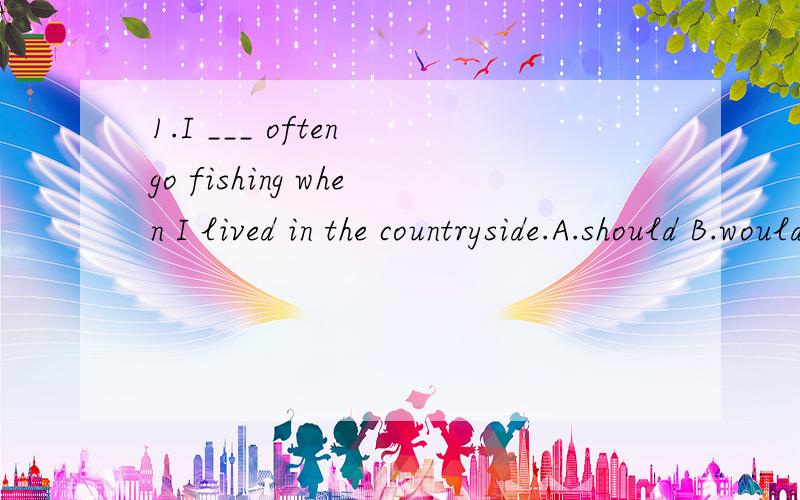1.I ___ often go fishing when I lived in the countryside.A.should B.would C.could D.might2.In western countries,Dec 24th is Christmas Eve,___ people will get together to celebrate the day.A.on which B.which C.during which D.that请简要说明原因,
来源:学生作业帮助网 编辑:作业帮 时间:2024/11/25 06:33:45

1.I ___ often go fishing when I lived in the countryside.A.should B.would C.could D.might2.In western countries,Dec 24th is Christmas Eve,___ people will get together to celebrate the day.A.on which B.which C.during which D.that请简要说明原因,
1.I ___ often go fishing when I lived in the countryside.
A.should B.would C.could D.might
2.In western countries,Dec 24th is Christmas Eve,___ people will get together to celebrate the day.
A.on which B.which C.during which D.that
请简要说明原因,
1.I ___ often go fishing when I lived in the countryside.A.should B.would C.could D.might2.In western countries,Dec 24th is Christmas Eve,___ people will get together to celebrate the day.A.on which B.which C.during which D.that请简要说明原因,
1.B 这里的would表示过去的某一喜好,过去经常性的动作.与used to do sth 稍有类似,used to do sth 是过去做,现在不做了,而would do 是过去做,现在做不做不一定,也就还做,也许不做.当然不是所有的would do 都是这个意思,要看上下文.
2.A 在圣诞前夜on Christmas Eve,介词用on,定语从句修饰Christmas Eve,用which 引导,把介词on放前面.这里也可以把on which 换成when
1....would often go fishing ...英语里描述过去经常性的动作时,如果有always, often, seldom, never这类频度副词,就要在其前面使用would。
2。on which people will get together... 这里使用which表示那个日期(12月24日),而我们说日期时,要用介词on。
1。"would" 在英文中与表示过去的时间状语连用时表示“过去习惯的动作”。选项A,C,D都 是表可能性的情态动词,因此不能选。该句可译为“当我住在乡村的时候,我(过去)经常钓鱼”。
2. "介词+which "是修饰时间或地点状语的关系连词。表示“在那时,”或者“在那个地方”。相当于关系连词"When "和"Where".而这个结构中介词的选定是由所修饰的表时间或地点决定的。
全部展开
1。"would" 在英文中与表示过去的时间状语连用时表示“过去习惯的动作”。选项A,C,D都 是表可能性的情态动词,因此不能选。该句可译为“当我住在乡村的时候,我(过去)经常钓鱼”。
2. "介词+which "是修饰时间或地点状语的关系连词。表示“在那时,”或者“在那个地方”。相当于关系连词"When "和"Where".而这个结构中介词的选定是由所修饰的表时间或地点决定的。
该句译为“在西方国家,12月24号,也就是在平安夜那天,人们会聚在一起庆祝”。由于这定语从句修饰的是“Christmas Eve”,因此用“on",不用"during".表示“在平安夜那天”。
不知道这样解释你 能不能理解。希望对你有帮助。
收起